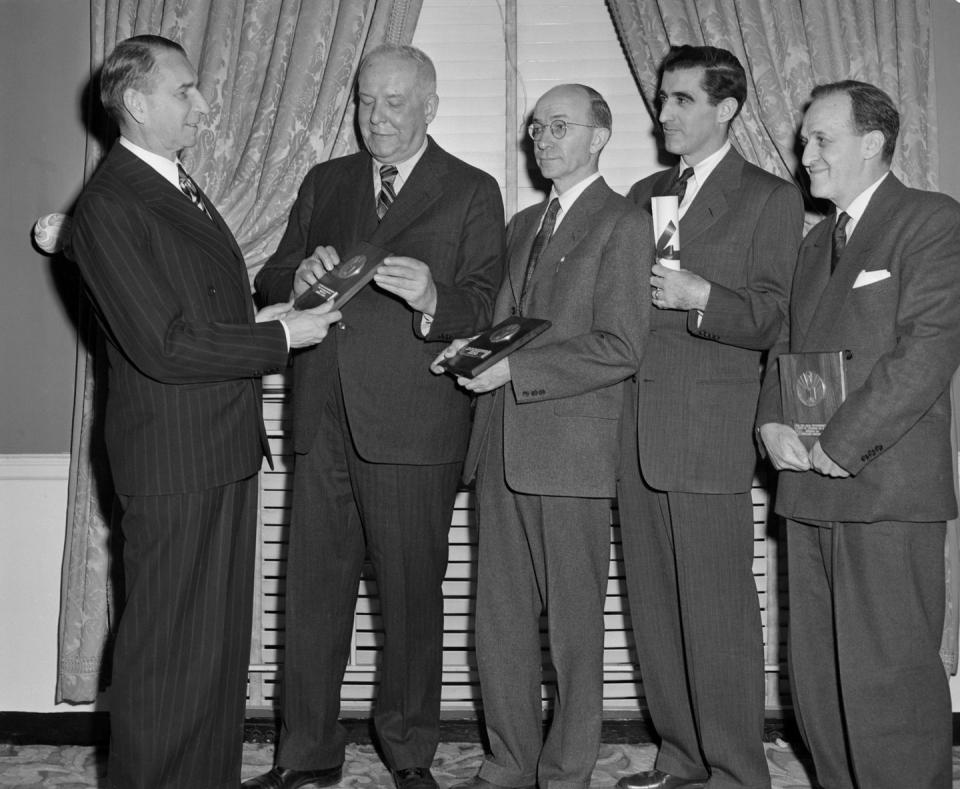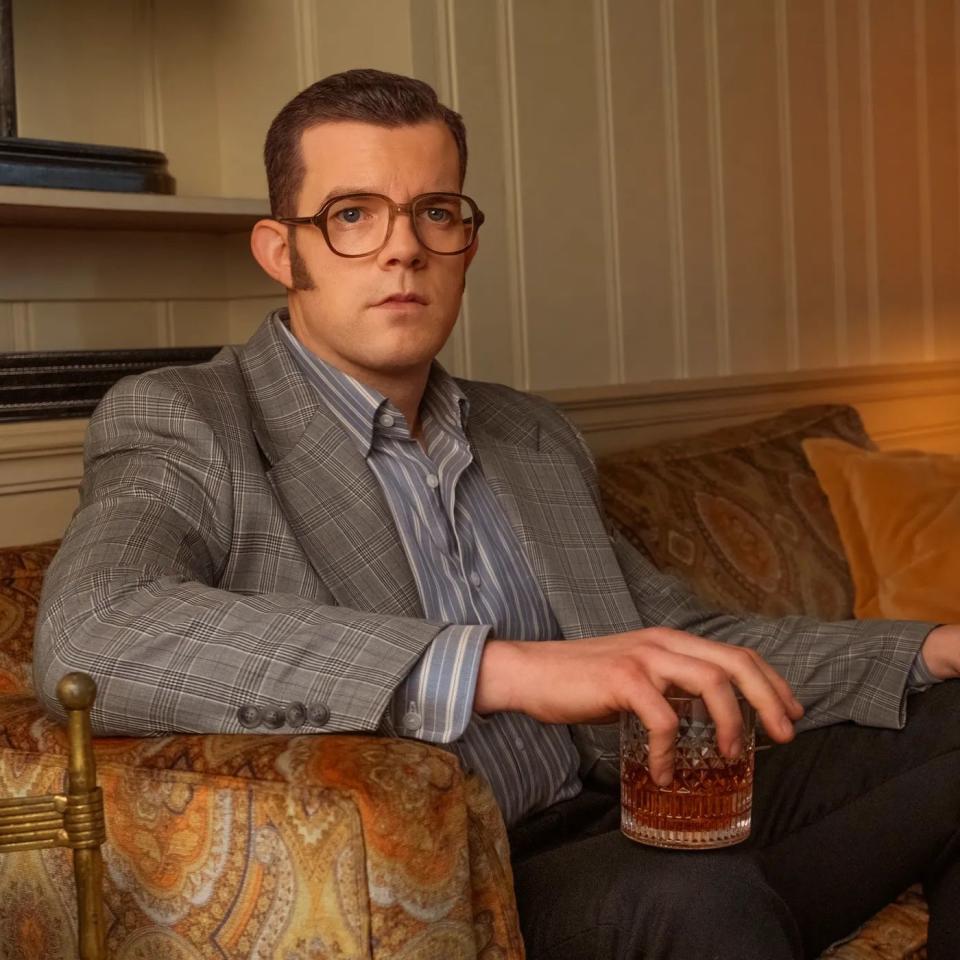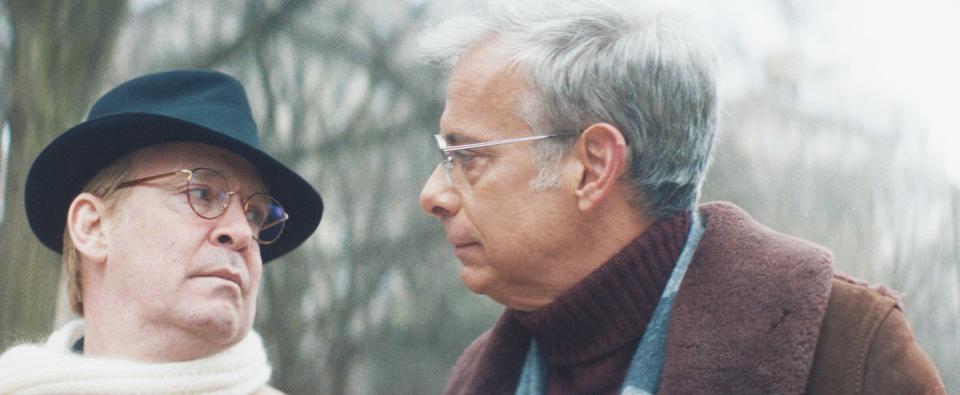Truman Capote Had a Troubled Love Life. But 'Feud' Tells a (Slightly) Different Story.
- Oops!Something went wrong.Please try again later.
- Oops!Something went wrong.Please try again later.
In the latest episode of FX's Feud: Capote vs. The Swans, “Hats, Gloves, and Effete Homosexuals,” we see another glimpse of Truman Capote’s ever-troubled love life. This time, while sobering up (or so he says) in Palm Springs, Capote falls for his handyman, Rick. Rick, who is played by Vito Schnabel, is young, handsome, and charming. Before long, Truman charms his way into a relationship. He and Rick couldn’t be more different from each other, but Capote doesn’t care—the Swans have turned against him, his Answered Prayers is still unfinished, and everyone is tired of his antics. All Capote wants is admiration—and Rick, who comes from “corn-fed” Illinois and has never been romantically involved with a man, is up for the job.
After their rendezvous in Palm Springs, Capote invites Rick back to New York and tries to integrate him into his high-society culture. He dresses him up, buys him a Rolex, and takes him to lunch with his friends. It’s no use. The poor, deeply confused man sticks out like a sore thumb. He can’t hold a conversation without talking about air conditioners and he looks deeply uncomfortable in a suit. One night, Rick declines to sleep with Capote because his favorite show is on—and soon after, their relationship fizzles out.
At the end of the episode, Rick packs his things and tells Capote he’s going home. “Well, you’re going sooner than I thought, but you stayed longer than I expected,” Capote says. They both knew this wouldn’t last—and that’s the tragedy of it all. They've used each other, but as Capote admits, “For some dumb reason, I can’t quite figure out how to be mad at you.”
Rick’s storyline, like the dreamscape with James Baldwin, is seemingly fictional and crafted to give the audience a better understanding of Capote's psyche. In this case, Rick is yet another failed relationship that burns bright and fast. A symbol of Capote's inability to foster stable relationships. Feud writer Jon Robin Baitz explained the use of these fabrications in an interview with Town and Country. “I often think that truth is a guess,” Baitz said. “Not, of course, when it comes to empirical things like this earth not being flat. But I think you can take a lot from the footage of what was happening, of all those people, and build a picture that occasionally goes under the skin of the event and contains sort of imagined reportage. That’s how you navigate it.”
Feud may take some creative liberties, but it does a fair job of depicting Capote’s turbulent love life. So, what’s the truth? Who did Truman Capote love? Below, we dove into his romantic history—which features a shocking love story with his most loyal friend.
Newton Arvin

One of Capote’s first known lovers was the literary professor Newton Arvin. Arvin began working at Smith College in New Hampton, Massachusetts, in 1922. During his 38-year-long career, Arvin was promoted to the director of the Yaddo Corporation—a writing retreat where he mentored Sylvia Plath.
Arvin met Capote at the Yaddo Corporation.. There aren’t many details about their first encounter, but they were first spotted together in 1946. That year, Capote dedicated his novel Other Voices, Other Rooms to Arvin, whom he learned many literary skills from. He once said, “Newton was my Harvard.” Today, Capote and Newton’s love letters are kept in Smith College's digital archive.
In 1960, Arvin’s career was cut short when he was arrested for owning magazines that depicted semi-nude men. The publications, Grecian Guild Pictorial and Trim, were illegal at the time, so Arvin pled guilty to pornography charges. He then retired and wrote the biography Longfellow: His Life and Work.
John O’Shea

John O’Shea, who is portrayed by Russell Tovey in Feud, was Capote’s next (publicized) boyfriend. Capote and O’Shea met in 1973. At the time, he was a married father with four children who lived in Long Island. Soon after meeting Capote, they began an affair—which, according to Town and Country, was accepted by O’Shea’s family.
It didn’t last long. O’Shea and Capote fueled each other’s drinking problems—and their relationship became toxic. One of Capote’s friends, actress and author Carol Marcus Matthau, said O’Shea was once so enraged that she threatened to shoot him. Unlike Capote’s other romances, his relationship with O’Shea was reportedly characterized by verbal and emotional abuse.
They eventually parted ways, but Capote remained close with O’Shea’s family and helped his daughter, Kerry (played by Ella Beatty), launch her modeling career under the name Kate Harrington. In episode 4, she moves in with Capote, only to discover that he’s just as troubled as her father.
Jack Dunphy

Jack Dunphy is Capote’s longest relationship and perhaps his one true love. He makes a few appearances in Feud, where he's played by Joe Mantello. Dunphy was a professional dancer and writer. His career took off in 1939, when he was hired to dance in a production of Oklahoma at the World Fair.
He met Capote at a party in 1948, shortly after splitting from his wife, Joan McCracken. “Truman arrived wearing a little cap and showing off,” Dunphy said. “I thought it was adorable.” When he and Capote were introduced, Dunphy had quit dancing and was focused on being a novelist (his 1946 book John Fury received critical acclaim). They hit it off instantly—and remained tethered for nearly 40 years.
Their relationship is said to have been bumpy but consistent. At first, they were romantic partners, but as Capote spiraled due to alcoholism and depression, their connection fizzled out. When Truman’s story "La Côte Basque" was published in Esquire in 1975, they transitioned into something akin to platonic life partners. Still, their lives remained intertwined, which is depicted in the show. In Capote’s lowest moments, he calld Dunphy for guidance.
In 1987, Dunphy published a novel about their relationship, titled Dear Genius: My Life with Truman Capote. In it, he wrote, “Truman and I were never together — together people as most couples are. Such proximity would have killed us. We were always dreaming away from wherever we were, thus repeating the pattern that had commenced in childhood, when one’s need to escape from one’s own kind was so savage, so burning in its intensity, that had either of us stayed home, he would certainly have perished.”
When Capote died, he assigned Dunphy to carry out his will, which Dunphy did without question. Years later, when Dunphy died, their ashes were reportedly scattered together at Long Island’s Crooked Lake.
You Might Also Like

